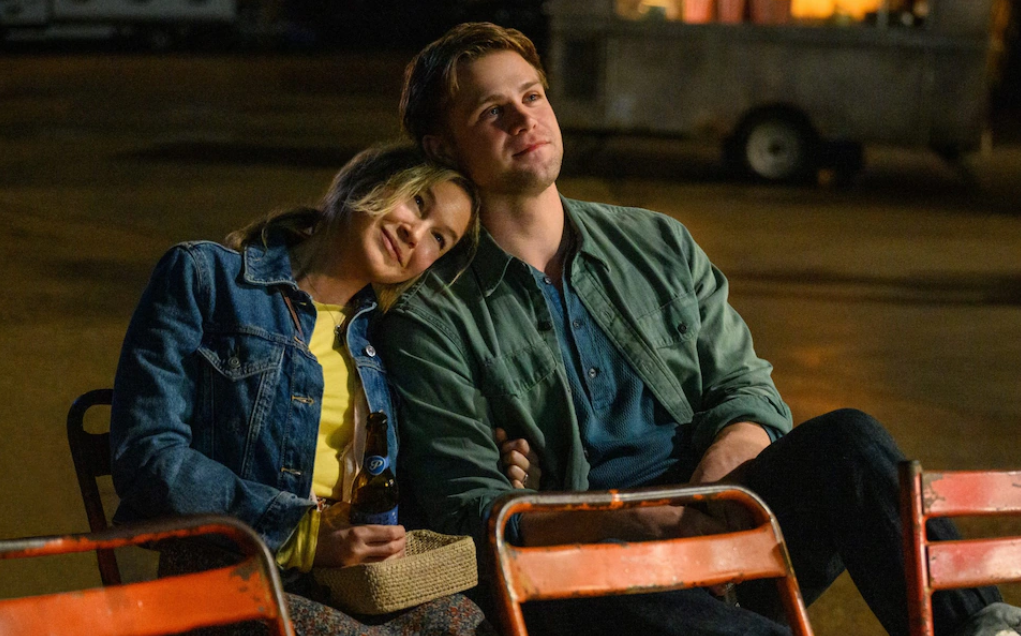Now in her 50s, Renée Zellweger’s Bridget is a singleton once more – and what a joy it is to see her back on our screens
Here is a thought to freeze the blood of Generation Britpop: Bridget Jones’s Diary is now almost as old as Bridget Jones was when she started writing it. Perhaps it has never been fully acknowledged outside of her fanbase, but Helen Fielding’s early-thirties media singleton, with her dauntless alcohol and nicotine intake, was always one of the great role-model-avatars of the Cool Britannia years.
Every young adult in the late 1990s and early 2000s either modelled their life on hers or had about ten female friends who did – though the equivalent figures for men were Liam Gallagher and Ali G, so we had nothing to laugh at.
That meant that over the course of the Bridget Jones film series, the character began to feel increasingly dated. What was hilariously recognisable in 2001 was a tad stale in 2004, and downright obsolete in 2016. But this terrifically funny and well-judged part four – by some distance the best of the bunch – makes a virtue of the cultural shift. Our heroine is now in her 50s, and waist-deep in motherhood – and the differences (and likenesses) between the Bridget we knew and the Bridget she’s become are expertly mined for big laughs and even bigger emotional skewerings.
As in Fielding’s third novel, adapted here by the author, Dan Mazer and Abi Morgan, Renée Zellweger’s Bridget is unattached once more; this time by virtue of widowhood. Her husband, Colin Firth’s Mark Darcy, met an absurdly noble-slash-tragic end in a Darfur minefield five years ago while brokering some sort of peace deal, and Bridget has since been single-mumming in a Hampstead cul-de-sac with the couple’s adorable offspring, Billy and Mabel.
A yen to get back on the dating scene and into the workplace prompts her to take up her diary again too. And before long, when she isn’t corralling talent at a Loose Women-like daytime magazine show, she’s enfolded in the gym-toned limbs of Leo Woodall’s Roxster – a toy-boy park keeper who, Mabel informs her flustered teacher (Chiwetel Ejiofor) during the school run one morning, “gives Mummy a special hairstyle every night”.
Bridget’s repeated humiliations in front of Ejiofor’s tweedy-but-loveable Mr Wallaker – also single, and age-appropriate to boot, so guess where that is going – proves an endlessly winning dynamic. It’s the comedy of British middle-class embarrassment, executed here as deftly as anything in peak Richard Curtis. Like me, you may be surprised by how much you’ve missed it.
Classic characters return, though are wisely never used as crutches. Emma Thompson is given a couple of scenes in which to be drily hilarious as Bridget’s terse gynaecologist, and there’s a lot of Hugh Grant’s Daniel Cleaver too at first – yet after chaperoning the audience back into Bridget’s world, this now-silvering roué graciously recedes.
Perhaps even more acutely than Zellweger – who’s just so delightfully at ease with Bridget, you can’t help but feel likewise – Grant nails the film’s elegiac yet rascally tone. As well as being funny, he’s what you might call reluctantly moving, playing bittersweet lines with a grimace-y disinclination that makes them hit 10 times as hard.

Despite some deeply buried nods to previous instalments – props, costumes, shot compositions; serious deep cuts – the film never comports itself like just more Bridget for the fans. Director Michael Morris’s background is in television drama, but Mad About the Boy is built for cinemas, with the sort of weekend-papers aesthetic you want to nest in – it’s a wallpaper and knitwear film – and photography to drink in at scale. (Hampstead looks glorious, as does the Lake District during a third-act school trip.)
Yes, there are corny bits, but what sort of Bridget Jones film would it be if there weren’t? Like Bridget’s own love life, the London-set romantic comedy has been in hibernation for a decade-plus. What an unexpected joy to see both revived in such style.



